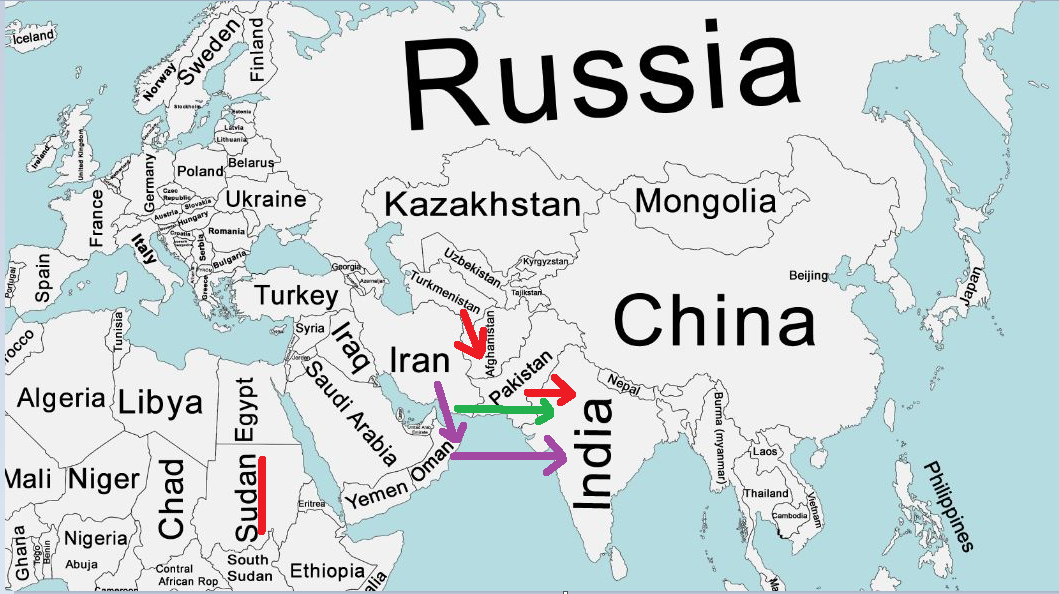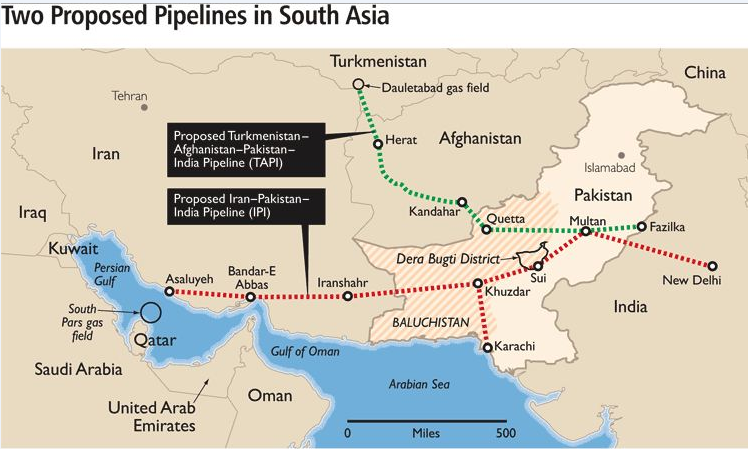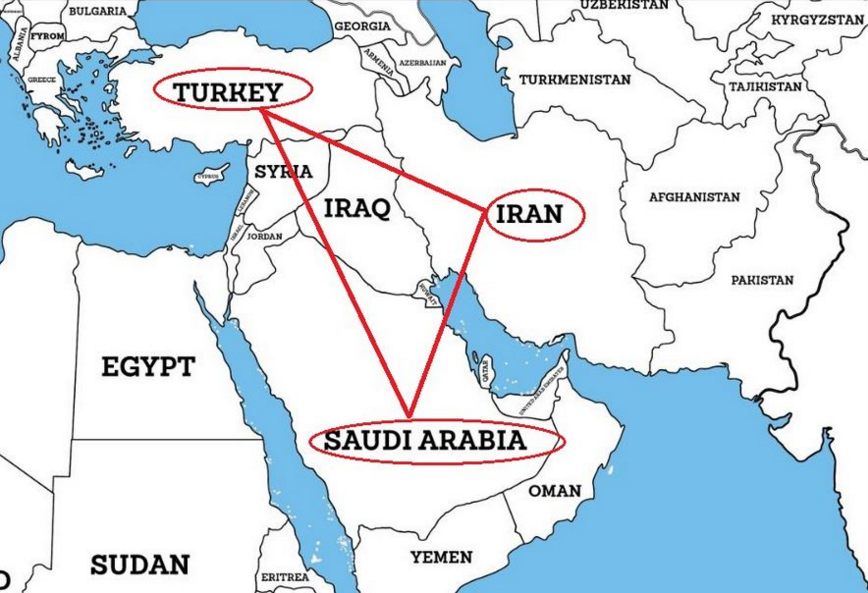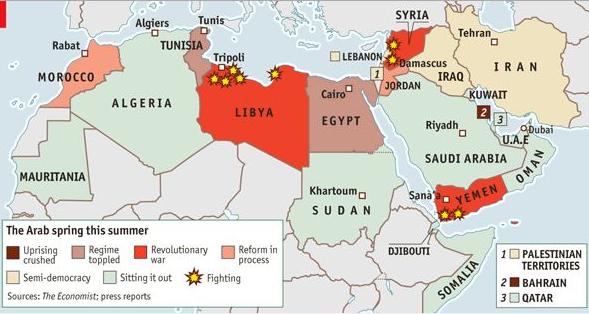The United States Has Spent 35 Billion $ in Afghanistan
The last 15 years the United States spent more than 35 billion dollars supporting the Afghan army against the Taliban, but the results have not been very satisfying. See Washington Post article “Stretched by its fight against Taliban, Afghan army raises recruitment age”, February 2015. The Americans were hoping that the Afghan army could “clean” Afghanistan from the Taliban, in order for the TAPI (Turkmenistan-Afghanistan-Pakistan-India) Pipeline to go ahead.
Map 1

The TAPI, if ever constructed, will supply India with natural gas, and that’s a very good thing because India is an American ally against China, and the TAPI pipeline will reduce India’s dependence on Iran, which is a Chinese ally. The proposed pipelines are TAPI, the Iran-Pakistan-India one, and the Iran-Oman-India. The last one has for India the additional advantage of bypassing Pakistan which is India’s greatest rival.
I have said many times how much TAPI pipeline hurts the Arabic and Iranian interests, and that’s why the Arabs support the Taliban and want chaos in Afghanistan. And that’s exactly what the Iranians want to, and that’s why the also support their old foe the Taliban in Afghanistan. See Wall Street Journal “Iran Backs Taliban With Cash and Arms”, June 2015.
Moreover, Afghanistan has traditionally been a springboard for terrorism i.e. Al-Qaeda etc. Remember that Osama bin Laden was living in Sudan until 1996, and when George Bush threatened to bomb Sudan, and the Sudanese were forced to ask Osama bin Laden to leave, Osama bin Laden transferred his base to Afghanistan. See the 1st and 2nd paragraphs of the following Guardian article “Osama: the Sudan years”, October 2001.
The amount spent by United States on the Afghan army, and the unsatisfactory results, proves the limitations of the aerial and naval superiority, when this superiority is not accompanied by “boots” on the ground. See also what happened in Iraq. It was very easy for the Americans to overturn Saddam Hussein, the Sunni socialist dictator, and bring to power the Shiite majority of Iraq, but to this very day the Americans have not managed to stabilize Iraq, because the Turks and the Arabs of the Gulf are supporting the Sunni Arabs of Iraq i.e. the ex people of Saddam Hussein.
And note that in Iraq the United States has strong allies, since the Arab Shiite (Shia) majority of Iraq is an American ally, and also the Kurds of Iraq are American allies. Even Iran is a US ally in Iraq. And still the United States cannot stabilize the country due to the fighting of the Sunni Arab minority which is supported by the Arabs of the Gulf and Turkey.
Imagine how much tougher things are in Afghanistan for the Americans, since they have almost no allies there. In Afghanistan the Americans have both the Arabs and the Iranians against them, and Russia, India and China, countries that would have a motive to support the US against the Islamic militants of Afghanistan, they are afraid to do so, because there might be retaliations in their countries i.e. terrorist attacks, since all of them have very large Muslim populations. There are 177 Muslims living in India, 23 million living in Russia, and 20 million living in Russia.
Map 2

http://newsblaze.com/pix/2011/0202/pix/TAPI_and_IPI_Pipelines.gif
Articles
“Stretched by its fight against Taliban, Afghan army raises recruitment age”, February 2015
https://www.washingtonpost.com/world/stretched-by-its-fight-against-taliban-afghan-army-raises-recruitment-age/2016/02/04/916e87fc-cb46-11e5-b9ab-26591104bb19_story.html
“Osama: the Sudan years”, October 2001
1st , 2nd Paragraphs
Bin Laden spent five years in the Sudan before being expelled in 1996. The authorities claim he was busy building roads and farming. But what was he really up to?
"Osama who?" says the information minister, when he is asked about the man who spent five years running half of Sudan's industries, and perhaps even a global terrorist network, from an office just round the corner. "Oh... that Osama."
President Bush's "with us or against us" speech made plain the consequences of not siding against Bin Laden, and Sudan has had further to scramble onside than almost any other country. It is still on America's hit list of states that sponsor terrorism - and Bin Laden's handprints are all over the place. There is his bullet-scarred house in a Khartoum suburb, his plane sitting at the airport, the companies he owned, the bank accounts...
http://www.theguardian.com/world/2001/oct/17/afghanistan.terrorism3
“Iran Backs Taliban With Cash and Arms”, June 2015
http://www.wsj.com/articles/iran-backs-taliban-with-cash-and-arms-1434065528
Saudi Arabia Faces the Arab Spring
Turkey says that she cannot support Saudi Arabia on the issue of the death of the Shiite cleric (see following Reuters article). Therefore I will assume that Turkey cannot support Saudi Arabia in her confrontation with Iran either. Does that mean that there is an agreement between Turkey and Iran to push for a sectarian war within Saudi Arabia?
Note that in December 2015 Saudi Arabia announced an anti-terror coalition which will include many Arab and non-Arab Muslim countries. See BBC article below. The truth is that this coalition will target Iran first of all, and ISIS too, where the Turkish-Saudi interests diverge. When I say ISIS I mean the Sunni Islamist militants who are supported by Turkey. You can call them ISIS or anything else that you like.
Map 1

Turkey and Qatar have been invited by Saudi Arabia, first because the primary target of this coalition is Iran, and second because Saudi Arabia had to invite Turkey too, otherwise it would be like publicly connecting Turkey to ISIS. Turkey could not exclude her participation either, because it would be like admitting her support to ISIS. And also Turkey wants to work with the Saudis against the Iranians in some places.
The coalition is mainly promoted with petrodollars from Saudi Arabia and United Arab Emirates, and it is a threat to Iran, but it is also a threat for Turkey’s ambition to lead the Sunni world. Besides targeting Iran, the coalition promoted by the Saudis will also attack the Sunni Islamists supported by Turkey, when the Turkish-Saudi interests diverge. It is not a coincidence that after the Saudis announced their anti-terror coalition ISIS declared war against Sauid Arabia. See the article of International Business Times below.
Turkey and Iran might be killing each other in Syria and Iraq, but they can always cooperate against the Saudi King in Saudi Arabia. The Turks can use their connections to help the Sunni Saudis revolt, and the Iranians can do the same with the Shiite Saudis. Note that Shiites constitute 10-20% of the Saudi population. This would happen while the Saudis have to make dramatic cuts to social spending due to low oil prices, which is going to discomfort the Saudi citizens who are not used to this kind of cuts. See the CNBC article below. That makes Saudi Arabia more vulnerable to an Iranian-Turkish cooperation within Saudi Arabia.
If that’s indeed the case it is easy to understand why some analysts talk about the worst period for Saudi Arabia since the crisis in the Saudi-American relations after the 9/11 attacks at the Twin Towers. Note that 15 out of the 19 terrorists that took part in the 9/11 attacks were Saudis. See the Independent article below. The 9/11 attacks in 2001 forced the Americans to move their military bases from Saudi Arabia to Qatar in 2002, and it definitely played a role in the decision to attack Sadam Hussein and Iraq in 2003. The attack in Iraq in 2003 was a total disaster for Saudi Arabia and a blessing for Iran.
I am not saying that the United States attacked Sadam Hussein in 2003 in order to revenge Saudi Arabia. I am saying that if the Saudis hadn’t turned to China, and if the Saudis hadn’t carried out all this attacks against the Americans, in order to force them to remove their military bases, the Americans would have thought twice about it. Of course for the United States to remove Sadam Husein was a blessing, because it strengthened their ally the Kurds, who were suppressed by Sadam, and who are also very rich in oil and natural gas. And also because Sadam Hussein was an international terrorist who funded every socialist terrorist organization on the planet. Moreover by toppling Sadam Hussein, the Shiite majority of Iraq that was suppressed by Sadam came to power and became an American ally.
But even though the Americans had all this benefit from overturning Sadam Hussein, they would have though twice before doing it, if their relations with the Saudis had not been so damaged. The proof is that the Americans did not overturn Sadam Hussein in 1991, after the first Gulf War, when Sadam Hussein invaded Kuwait. The Americans defeated Sadam Hussein, they reached Baghdad, but they did not overturn him. The reason was that if Sadam was overturned, the Shiite majority would rise to power, and the doors of Iraq would be widely opened to Iran. Sadam Hussein was a Sunni Arab socialist, who did not have good relations with the Sunni Arab Islamists of the Persian Gulf, but he had even worse relations with the Shiite Persian Islamists of Iran. Sadam Hussein fought one of the bloodiest wars of the Middle East against Iran in the 80’s (1980-1988).
Therefore if the Saudis face a Turkish-Iranian coalition domestically, at a time of reduced social spending, without having the US support, then there is the chance that the Saudis will face the Arab Spring. Note that the Saudis were among the aggressors in some of the Arab Spring wars i.e. Syria, Iraq, Libya, and among the defenders in some others i.e. Egypt, Bahrain, Yemen. I am not saying that the Saudis will face the Arab Spring domestically, and I am not in a position to predict if this will happen. But since 2011, when the Arab Spring broke out, many analysts are talking about whether the Saudis will eventually face the Arab Spring. I guess that this question is more intense now.
Map 2

Articles
“Turkey says cannot support Saudi execution of Shiite cleric”, January 2016
http://www.reuters.com/article/us-saudi-iran-turkey-idUSKBN0UI1TD20160104
“ISIS Vows War Against Saudi Arabia: Islamic State Group Threatens Arab Monarchy After Announcement Of Anti-Terror Coalition”, December 2015
http://www.ibtimes.com/isis-vows-war-against-saudi-arabia-islamic-state-group-threatens-arab-monarchy-after-2232602
“Saudis announce Islamic anti-terrorism coalition”, December 2015
http://www.bbc.com/news/world-middle-east-35099318
“Saudis unveil radical austerity program”, December 2015
http://www.cnbc.com/2015/12/29/saudis-unveil-radical-austerity-programme.html
“Saudi Arabia insists it had nothing to do with 9/11 attacks”, July 2015
http://www.independent.co.uk/news/world/americas/saudi-arabia-insists-it-had-nothing-to-do-with-911-attacks-and-demands-to-be-dropped-from-relatives-10430795.html







